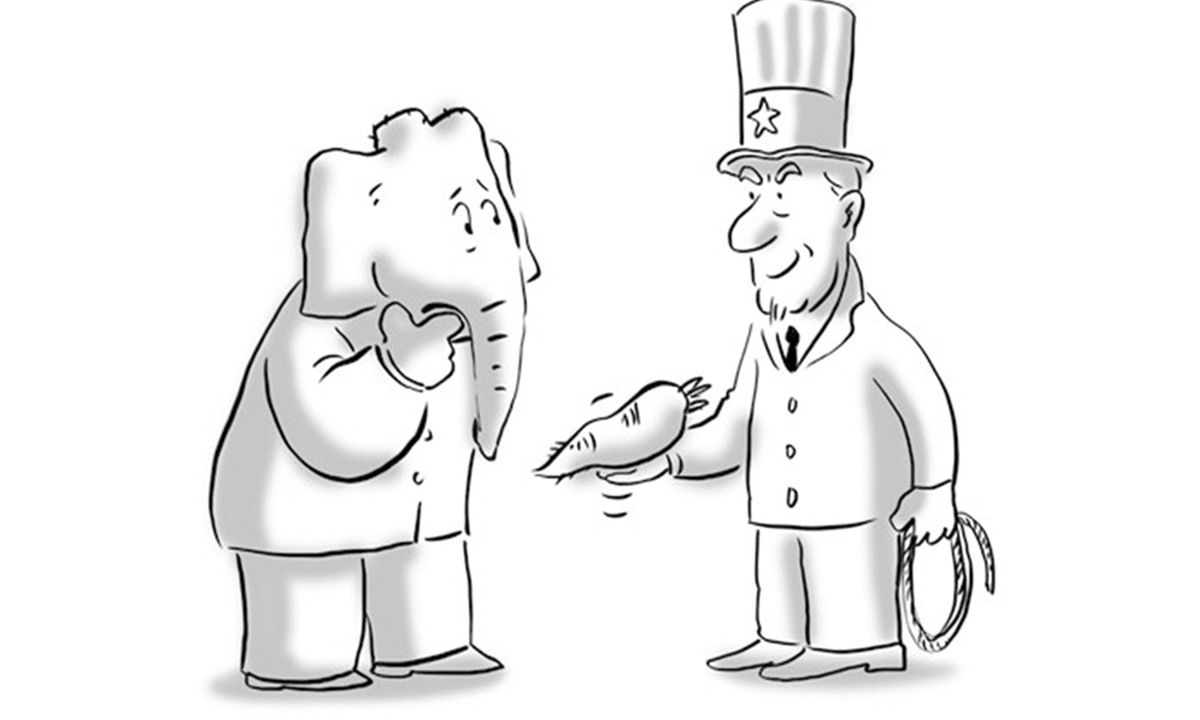
Illustration: Liu Rui/GT
Joe Biden was projected to be the winner of the 2020 presidential election after he gained the 270 electoral votes needed to win the election, according to multiple US media outlets. Indian Prime Minister Narendra Modi on Sunday congratulated Biden on his victory on Twitter, praised Biden's vital contribution to strengthening India-US ties during his tenure as vice president, and said he looks forward to closer cooperation between the two countries once again to take the relations to a higher level.Cooperation will remain the main theme of US-India relations in the next stage after Biden becomes the president as the overall direction of ties between the two countries will not change simply due to who sits in the Oval Office. The sustained warming of US-India relations over the past two decades began with former US President Bill Clinton's visit to India in March 2000. The first US-India military cooperation agreement was completed under the former US president Barack Obama's administration. Obama also supported India's bid for a permanent seat on the United Nations Security Council. In a policy paper released by the Biden Campaign in August, Biden has expressed the importance he attaches to a cooperative relationship with India, strategically, economically and on security.
Likewise, the new US government won't have much change on the general policy of the Indo-Pacific region, except for a possible adjustment over the name of Trump's Indo-Pacific Strategy. It will be very likely to become a 2.0 version of Obama administration's Rebalance to Asia and the Pacific strategy to some extent, where New Delhi will continue to be expected to play an important role.
Surely, differences will still exist while the cooperation between the two countries keeps getting stronger. During Trump's presidency, differences between the two sides have been mainly about trade. Yet probable future disputes between the US and India may center more on issues of human rights and religious freedom. Biden has also been speaking out against Indian Prime Minister Narendra Modi government's human rights violation problems. Therefore, the trade dispute between the US and India may be eased during Biden's term, but contradictions and differences on religious freedoms and human rights will enlarge.
It is within the realm of possibility to forecast that US-India relations may continue to strengthen in the future even though some differences and conflicts exist. This is a trend based on the past trajectory between the two over the last 20 years, which is to protect the common interests of both countries through cooperation, especially with strategic military cooperation.
To better deal with India's controversial human rights issues, the future Biden administration may ask vice president-elect Kamala Harris, an Indian American, to manage negotiations with the Modi government. She may be asked to exert pressure on New Delhi to make compromises on relevant issues as Washington wishes.
Harris, as US' first female and vice president of South Asian descent, is expected to play an important role as a bridge between the communication between the US and India on bilateral diplomatic issues - and even with South Asian regional issues.
When it comes to the border standoff between China and India, the incoming Biden administration will also probably not take a markedly different stance from the Trump administration. Both Democrats and Republicans are clear that a long-term confrontation and deteriorated relationship between China and India will be of great benefit for the development of the US-India relations - all the while knowing that the tensions between China and India will unlikely lead to a war - at least in the short term, nor will it bring a deadly hit to peace and stability in the region.
Biden's campaign in particular mentioned China in his administration's Indo-Pacific plan, in which the US would work with India to support a rules-based and stable Indo-Pacific region where no country, including China, is able to threaten its neighbors with impunity. It is almost certain that Biden will keep up a tough stance with China with some differences on the specific measures that the Trump administration introduced. This will also further boost its cooperation with India on China related issues.
The author is director of the research department of the National Strategy Institute at Tsinghua University. opinion@globaltimes.com.cn
